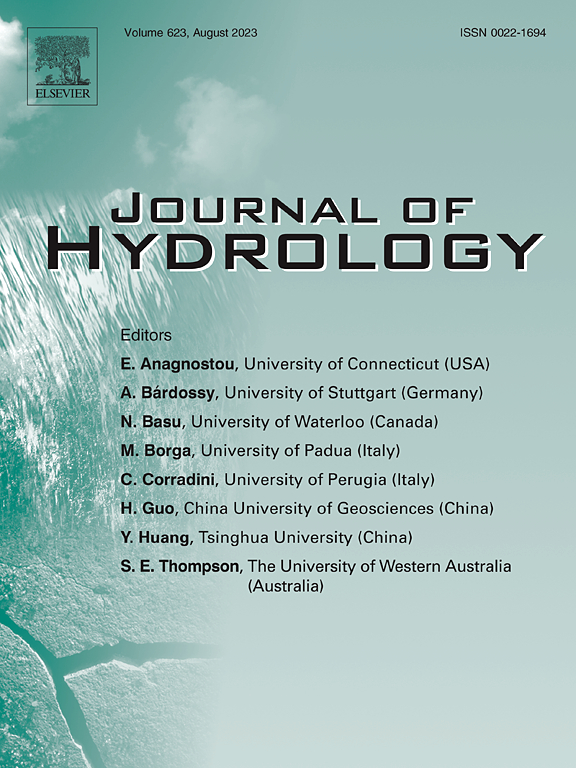不同水文条件下多目标梯级水库高效调度的改进非支配排序遗传算法III
IF 6.3
1区 地球科学
Q1 ENGINEERING, CIVIL
引用次数: 0
摘要
水库调度在自然、文化和生态环境中变得越来越重要。然而,随着利益和约束的增加,调度问题的复杂性上升,调度的范围显著扩大。为解决多目标、多约束的水库调度问题,迫切需要实用高效的优化方法,提供科学合理的管理解决方案。为了应对这些挑战,本文建立了一个长期的多目标模型,以发电量(通过水电站产生的电能)、出力(水库运行时能提供的最小发电量或出力)和流量(水库内和通过水轮机的最低水流)为重点。提出了一种改进的非支配排序遗传算法Ⅲ(INSGA-Ⅲ)来确定梯级水库群的最优调度方案。INSGA-Ⅲ采用Pareto集合对种群进行更全面的初始化,采用精英交叉保证后期收敛到最优解的能力,并结合lsamvy flights在早期探索更大的范围。使用一组基准函数进行性能测试,并通过IGD指标和运行时验证其在各种基准函数上的高效性能。本文以金沙江梯级水库群为研究对象。首先,通过对Pareto前缘、分布和平均值的分析,验证了INSGA-Ⅲ求解油藏问题的可靠性和有效性。随后,结合主客观数据,采用秩和比法在不同场景下从INSGA-III Pareto前沿选择最优解。分析了各水电站的发电情况和库区水位变化趋势。金沙江梯级水库的实例研究表明,该模式在保证下游生态完整的同时,实现了发电与水电站稳定的平衡。与其他算法相比,INSGA-III具有优越的稳定性和性能。本研究建立的模型集成了多种需求,所提出的方法有效地解决了这些复杂性,为区域调度提供了有价值的参考。本文章由计算机程序翻译,如有差异,请以英文原文为准。
Improved non-dominated sorting genetic algorithm III for efficient of multi-objective cascade reservoirs scheduling under different hydrological conditions
Reservoir scheduling is becoming increasingly critical in natural, cultural, and ecological contexts. Nevertheless, with the proliferation of interests and constraints, the complexity of scheduling problems rises, and the scope of scheduling expands significantly. To tackle multi-objective and multi-constraint reservoir scheduling problems, practical and highly efficient optimization methods are urgently warranted to offer scientific and rational management solutions. To address these challenges, a long-term multi-objective model is hereby established, focusing on power generation (production of electrical energy through hydropower stations), output (the minimum generating capacity or output that the reservoir can provide during operation), and flow (the lowest stream flow within the reservoir and through the turbine). An improved non-dominated sorting genetic algorithm Ⅲ (INSGA-Ⅲ) is proposed to determine the optimal scheduling scheme for a cascade reservoir group. INSGA-Ⅲ employs a more comprehensive initialization of the population using the Pareto set, adopts elite crossover to ensure the ability to converge to the optimal solution later, and incorporates Lévy flights to explore a wider range in the early stages. Performance testing is conducted using a set of benchmark functions, and its efficient performance on various benchmark functions is verified through the IGD indicator and runtime. This study examines a cascade reservoir group of the Jinsha River. Firstly, the analysis of the Pareto front, distribution, and averages confirms the reliability and efficacy of INSGA-Ⅲ in solving reservoir problems. Subsequently, incorporating both subjective and objective data, the rank-sum ratio method is employed to select optimal solutions from the INSGA-III Pareto front across different scenarios. Following that, the power generation situation of each hydropower station and the trend of reservoir water level changes are analysed. The case study of the Jinsha River cascade reservoirs demonstrates that this model achieves a balance between power generation and hydropower station stability while also safeguarding downstream ecological integrity. Compared to other algorithms, INSGA-III demonstrates superior stability and performance. The model established in this study integrates multiple demands, and the proposed method effectively addresses these complexities, offering a valuable reference for regional scheduling.
求助全文
通过发布文献求助,成功后即可免费获取论文全文。
去求助
来源期刊

Journal of Hydrology
地学-地球科学综合
CiteScore
11.00
自引率
12.50%
发文量
1309
审稿时长
7.5 months
期刊介绍:
The Journal of Hydrology publishes original research papers and comprehensive reviews in all the subfields of the hydrological sciences including water based management and policy issues that impact on economics and society. These comprise, but are not limited to the physical, chemical, biogeochemical, stochastic and systems aspects of surface and groundwater hydrology, hydrometeorology and hydrogeology. Relevant topics incorporating the insights and methodologies of disciplines such as climatology, water resource systems, hydraulics, agrohydrology, geomorphology, soil science, instrumentation and remote sensing, civil and environmental engineering are included. Social science perspectives on hydrological problems such as resource and ecological economics, environmental sociology, psychology and behavioural science, management and policy analysis are also invited. Multi-and interdisciplinary analyses of hydrological problems are within scope. The science published in the Journal of Hydrology is relevant to catchment scales rather than exclusively to a local scale or site.
 求助内容:
求助内容: 应助结果提醒方式:
应助结果提醒方式:


